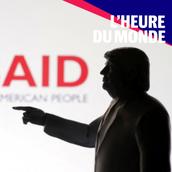AIDS: End of US aid risks 'erasing' more than twenty years of progress, according to UNAIDS

The interruption of American international aid risks "erasing" more than twenty years of progress in the fight against the AIDS pandemic, warns a report presented Thursday, July 10 in South Africa by the Joint United Nations Programme on AIDS (UNAIDS), the UN agency responsible for fighting AIDS. Approximately 31.6 million people are receiving antiretroviral treatment, according to a 2024 figure, and the number of deaths linked to the virus has more than halved compared to 2010, the report recalls, which revives fears weighing on prevention and treatment programs.
Historically the largest humanitarian donor, the United States abruptly reduced its international aid after Donald Trump returned to the White House on January 20. The 83% cut in American funding – a figure announced by the government – could lead to more than 14 million additional deaths by 2030 , according to a study in the medical journal The Lancet published on July 1. The greatest impact of this aid was observed for preventable diseases, notably with mortality due to HIV/AIDS, reduced by 74%.
"It's a ticking time bomb.""We are proud of our results but concerned about this sudden interruption, which is erasing the progress made," the agency's executive director, Winnie Byanyima, told Agence France-Presse (AFP) before the report's presentation. "Priorities may change, but you don't just withdraw vital support from people," she said, in response to the Republican president's decision.

"We've gone from a situation where people were dying every day to a point where [AIDS] is really a chronic disease," she said, so "the question of whether the investment was worth it doesn't arise (...) It saves lives."
In April, UNAIDS assessed the consequences of a permanent suspension of the US-backed Emergency Plan for AIDS Relief. According to the UN agency's calculations, suspending this aid would cause more than 6 million new infections and 4.2 million deaths in four years, bringing the pandemic back to levels not seen since the early 2000s.
"It's not just a lack of money, it's a ticking time bomb," Byanyima insisted. In Nigeria, for example, the number of people receiving preventive prophylactic treatment to prevent transmission of the virus fell by 85% in the first few months of 2025. "The way the world has managed to unite [against AIDS] is one of the most important pages of progress in global public health," she stressed.
A reform of international financial institutionsThe fight against AIDS, supported by grassroots activism, remains "resilient by nature," the leader hopes, and in 25 low- and middle-income countries out of 60 studied by UNAIDS, governments have managed to partially compensate for the shortfall.
Crucial medical research into prevention and treatment has already been halted, including in South Africa, a country at the forefront of research and with one of the highest AIDS prevalence rates in the world. The latter funds "77% of its AIDS treatments and its 2025 budget includes a three-year increase of 5.9% in its health spending dedicated to the fight against the virus," the press release states.
"We need to move towards nationally financed and country -specific responses," Byanyima said, while calling for debt relief and reform of international financial institutions to "create fiscal space for developing countries to finance their own responses."
This political decision by the US administration puts the brakes on the "The Path That End Aids" plan initiated in 2021 by UNAIDS, which aimsto eradicate AIDS as a public health threat by 2030.
The World with AFP
Contribute
Reuse this content




